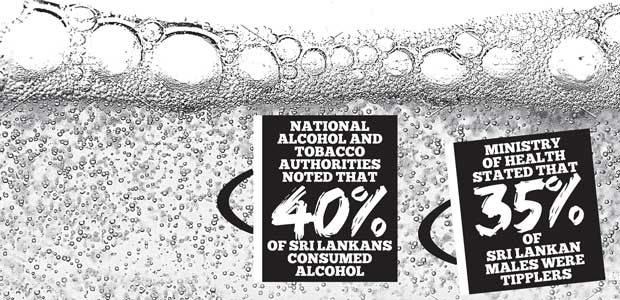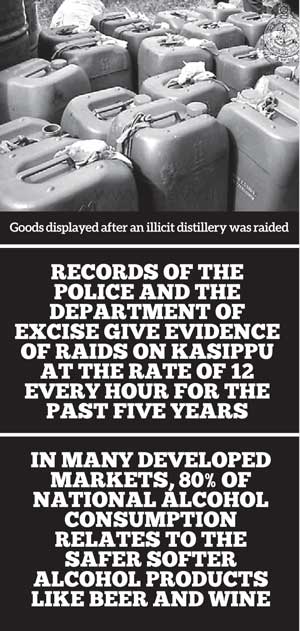Reply To:
Name - Reply Comment
Last Updated : 2024-04-24 15:12:00

 Following Finance Minister Mangala Samaraweera’s proposal to impose excise tax based on the volume of alcohol and type of liquor, much has been said and discussed over the media on the relief it provides to the price of soft alcohols like beer and wine. Whilst the majority of commentary over digital and social platforms have tended to welcome this proposal as a step in the right direction, we have also observed a number of politicians and press stating that this measure will bring about ill consequences to public health.
Following Finance Minister Mangala Samaraweera’s proposal to impose excise tax based on the volume of alcohol and type of liquor, much has been said and discussed over the media on the relief it provides to the price of soft alcohols like beer and wine. Whilst the majority of commentary over digital and social platforms have tended to welcome this proposal as a step in the right direction, we have also observed a number of politicians and press stating that this measure will bring about ill consequences to public health.
It is imperative to consider some practical observations and ground realities during this debate. For instance, some of the lobby groups state that only 6% of Sri Lankans consume illicit alcohol in this country. They state that there are no national level studies on illicit alcohol usage, but then they themselves state that “technically sound sub-national studies” show that illicit, or kasippu, consumption is less than 10% of the population or not more than 6% of the total consumption. However, these NGOs and other affiliated offices merely need to consult the 2014 Global Alcohol Report of none other than the World Health Organiszation, which puts the figure at 45% of consumption. If WHO’s findings don’t provide statistics at a national-level, then they merely need to consult the records of the Sri Lanka Police and the Department of Excise, which gives evidence of raids on kasippu at the rate of 12 every hour for the past five years. This is a tall order for a country where it is alleged that the illicit liquor consumption is only 6% per cent of total consumption. A close inspection of the statistics also reveals that there has been no reduction in the numbers consuming illicit liquor.
Furthermore, in a report published last year Vice President of the Temperance Association of Sri Lanka Dr. Anula Wijesendere notes that over 55% of alcohol consumption among males relates to illicit alcohol or kasippu. In a separate report that same year, the National Alcohol and Tobacco Authority noted that 40% of Sri Lankans consumed alcohol, whilst the Ministry of Health stated that 35% of Sri Lankan males were tipplers. With all these facts before us, the claims by the Minister of Health and other vested parties that the total alcohol consumption in the country was no more than 20% of the population holds no water.
Illicit trade
The argument that increasing the price of all alcohol products will reduce consumption is a failure. In that event, the multitude of price increases over the years should have disrupted the existence of the alcohol industry in this country. It persists because there is demand. When Sri Lankan consumers can no longer afford to purchase legitimate products, they then turn to kasippu – which is widely prevalent even in the Western Province. People are driven toward illicit liquor because of cheap price and easy availability. If the illicit trade is being dealt with by appropriate law enforcement then the WHO need not report 45% volumes in its report this year. There are many examples the world over, which have also been cited by the WHO in its reports, where high prices of legal alcohol products have driven consumers underground. For example, in Australia in 2015, researchers found consumers switching to illicit products including narcotics due to the high price of alcohol, making even substances such as cannabis and ecstasy a more affordable choice. The findings are published and are easily accessible. Is this what we want for Sri Lanka too?
 Is there a regulating authority?
Is there a regulating authority?
To safeguard against youngsters taking to alcohol at an early age, the Government in 2006 introduced a legislation to halt the sale of alcohol products to persons below 21 years of age. This makes it very late for a Sri Lankan to be legally cleared before he can purchase alcohol. This law is enforced islandwide at all legal sales outlets. But who is monitoring its implementation at the illicit liquor dens islandwide? Who is collecting tax from the 45% who consume kasippu? Is there any regulating authority or standard that monitors the method of producing kasippu, which retails for low as Rs. 200 a bottle in some parts of the island? It is well and good to question and oppose the actions and existence of the legal alcohol trade. But the same thinking should be applied when dealing with the kasippu trade. No one seems to be able to muster the courage for this!
In many developed markets, 80% of national alcohol consumption relates to the safer softer alcohol products like beer and wine. The per capita consumption of pure alcohol in these countries are much lower than countries like Sri Lanka. This is achieved via an effective process of price, education and distribution that favours softer safer alcohols. There is adequate scientific and market data available globally that corroborates their success. WHO figures on Sri Lanka’s kasippu problem is corroborated by the Colombo University research findings which put the figure at 49% of the total consumption. As alluded to before, people choose kasippu because it is cheap. ****Thus, beer and wine are the naturally the safer legal alternatives that policy-makers must promote to control the situation, rather than provide an outlet that enhances the consumption of illegal spirits.
The proposals laid out in the Budget reveal long-term thoughts on developing a safe, sustainable and responsible alcohol culture. Having spent decades at the wrong end of the global alcohol consumption index, this proposal provides the foundation to get it right! It may not serve the interest of anti-alcohol lobbies who promote a state of prohibition, but prohibition can never be a reality and it breeds a far more dangerous culture of criminal activity which would be more difficult to control as the Americans tried and failed in the early 1920s, and as India and Africa did in certain states. What is proposed is not to make beer or alcohol products freely available in every roadside grocery; what has been proposed is a first step in a systematic process to correct the balance of alcohol consumption in the country towards safer legal products as opposed to illicit. This is a policy and a proposal that we must all support for the sake of the public, health and future generations, and also to safeguard state revenue which is essential to uplift public services, all round. It is our sincere hope, that we could all rise above petty politics and personal agendas to do what is right by the country and its people, to ensure that we will finally graduate from a developing state and take our rightful place on the world stage.
(Lionel Gunatunga is a retired superintendent of Government and private plantations with over 30 years of experience in the Central and Southern Provinces and was engaged in plantation administration and operations. He is now engaged in social and education development programmes amongst rural communities. He can be reached at lal.gunatunga@gmail.com)

Add comment
Comments will be edited (grammar, spelling and slang) and authorized at the discretion of Daily Mirror online. The website also has the right not to publish selected comments.
Reply To:
Name - Reply Comment
US authorities are currently reviewing the manifest of every cargo aboard MV
On March 26, a couple arriving from Thailand was arrested with 88 live animal
According to villagers from Naula-Moragolla out of 105 families 80 can afford
Is the situation in Sri Lanka so grim that locals harbour hope that they coul